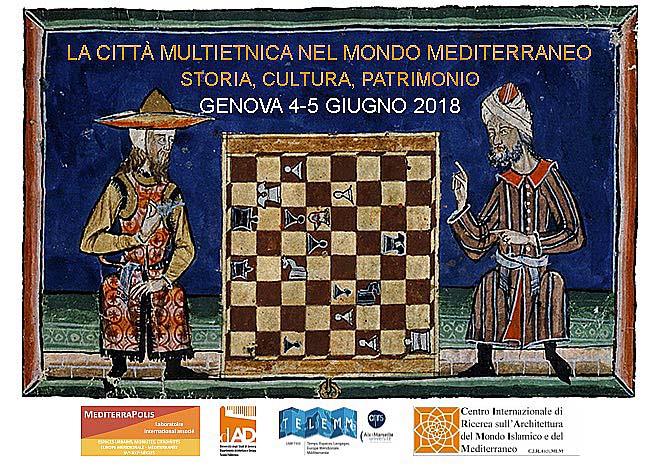
In the Mediterranean world the encounter/clash of people and civilizations has always been particularly rich, varied, intense, going often so far as to deeply mould the shape of cities, both along the coasts of the Mediterranean and in the hinterland of countries overlooking it, for which the sea was an undisputable horizon of reference. Urban developments and settlement patterns bear witness to those processes (ports, fairs, fondachi, ghetti), as well as linguistic uses and eating habits, social and juridical customs; as do many of the most typical expressions of European art and culture, as a result of an ancient − albeit not always peaceful – familiar coexistence with foreigners.
This meeting aims to foster a discussion about the continuities and disruptions which have conditioned the multi-ethnic dimension of our cities. We would like to focus on the specificities of places and time in our millennial history that have produced both tangible and intangible cultural heritage (a heritage which today seems strongly under attack). We aim for a historical perspective – by drawing attention on well-documented case-studies offering comparative insights – without however forgetting to ask ourselves the meaning of our research in the troubled world we live in; without anachronisms, but also without hiding behind the pretext of specialisms, while in front of our eyes the Mediterranean world is more than ever a theatre of death, exclusion, suffering. In other words, we would like to broaden the traditional horizons of our disciplines under the issues of our times, questioning the role of historical research and the forms of scientific communication nowadays, when old practices seem more challenged than ever by the overwhelming expansion of new technologies.
On these grounds, the meeting will be structured so as to allow the maximum of flexibility both in the forms and contents of the discussion. Depending on the number and subject of the selected proposals, the Scientific Committee will organise some thematic/chronological sessions, entrusted to discussants who will introduce and lead the debate. Furthermore, the applicants are also strongly encouraged to submit proposals based on new forms of dissemination, such as posters, video/photographic footage, multimedia installations; these will be included in an exhibition taking place alongside the meeting in Genoa and later traveling to other venues.
CALL FOR PAPERS
Call for papers is now open for proposals on any topic consistent with the lines mentioned above, with no chronological or disciplinary limits. In selecting the applications, however, the Scientific Committee will give priority to case-studies presented in a comparative perspective, capable of stimulating cross-cutting interests. Topics could include, but are not limited to:
• Towns and migrations in the Mediterranean world
• Nations, empires, metropolis: the multiethnic dimension of capital cities
• Tangible and/or intangible walls, barriers, fencing: old and new practices of urban segregation
• Identity landmarks in urban space
• The controversial heritage: the transmission of a composite memory within a multi-ethnic society
• Between two (or more) peoples: brokers, interpreters, translators, vocabularies
• Norms, rights, ideologies of citizenship
• Minorities in cities: settlement strategies and integration trends
• Places of welcome, places of exclusion
• Colonies / Colonialisms: old models, new contexts
• Resource or threat? Foreigners in towns in times of trouble
• The arts: means of dominion, expression of identity
• Border cities and places (ports, coasts, crossings points)
Proposals can take different forms, provided they are methodological concerned: short papers (max 10-15 minutes), posters, video footage and/or photographic shows, multimedia installations. In these latter cases, the Scientific Committee reserves the right to ask the selected authors to adjust their proposals according to the technical constraints of the exhibition’s venue. Proposals must be submitted via email to convegno2018@storiaurbana.org by the deadline of February 11, 2018, with a brief abstract (max 1000 chars) and a curriculum vitae of the author (max 1000 chars). Acceptance will be notified by March 15, 2018. All selected materials will be published online on AISU website (in Italian, English or French), with ISBN and after double blind peer review. A choice of the most original and interesting works will be also collected for further publication in a book that will be submitted to a top-rank publishing house.